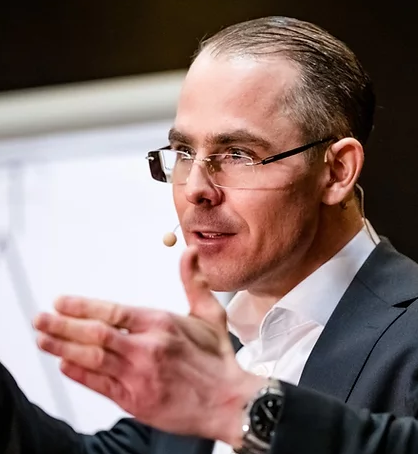Author: Thierry Altenhoven, PMP

A special keynote was part of the Annual Members Meeting (AMM 2022) on the 10th of February. It was called “Impact Warrior Excellence: How To Master Tough Times!" and was presented by the special guests Michelle Xue Wang and Florian T. Hochenrieder.
Michelle and Florian both inspired and guided us to successfully lead ourselves and our teams through the tough and uncertain future.


Michelle is an award-winning keynote speaker and author of six books. She is a trusted advisor for global top companies, a master of exchange of change projects and sought after executive coach. Michelle describes herself as an impact warrior and survival talent. Today, she helps project leaders, executives and entrepreneurs, with her experience and expertise, to lead themselves and to shape their personal and professional change.
Florian lives and loves effective leadership. He has been doing it for almost 24 years. He delivers strong impulses and best practices for your leadership and business successes. Florian also teaches the SuccessFactors of bold digital leadership. He has successfully guided over 5000 executives and entrepreneurs worldwide to greater leadership and impact.
During the keynote, Michelle and Florian went through 6 pillars, the "6 C", the foundation to act like an excellent impact warrior, along life, the career or projects.
VUCA3
Victory loves preparation…and agility
Before showing how to master tough times by leading ourselves and others for impact and excellence, the environment had to be taken into consideration first.
They reminded us that we live in a VUCA world (Volatile, Uncertain, Complex and Ambiguous world). According to Florian, this VUCA world has been existing for a long time. (For example, the Egyptians during the building of the pyramids were already in this world). When he makes a flashback of his life, he also faced a VUCA world at each step of his career. So, it is an usual state of the current reality. That's why he reframed VUCA in a more positive way and translates it with the V for Victory loves preparation, Uncertainty replaced by Unfair advantages in the sense that we are clearly positioned and we create significant value-add for our stakeholders, C for turning Chaos into Clarity and A, 3 times with be Agile, be Adaptable and be Aligned with a great honorable cause.
Lead yourself
To perform the Impact Warrior Excellence, it's all about leading ourselves because the only enemy we have is ourselves. The idea is to stare down the bad rules inside ourselves and to nourish our inner positive and impactful energy. We are able to inspire, enable and lead others by our example.
Y = f(xi) = 6C!
When we talk about impact, it stands for your results, your targets, your objectives, your outcome that you want for yourself, your team, your company and for your life. Michelle and Florian created a formula (see above subtitle). The Y is the impact, it is a function of several factors (xi) influencing this impact. To maximize the impact, it has to reach excellence. Excellence is being effective, being efficient and being elegant at the same time. The 6C are the keys to reach the Impact Warrior Excellence.
80 / 20 / 0 / 0 -> 30 / 30 / 30 / 10
In our daily business but also sometimes in our life, we spend our time through a state of 80, 20, 0, 0. We waste 80% of our time, energy, resources and money on daily emergencies, on mails, on meetings, on tasks, on issues that distract us, get us off track, make us stressed. Just 20% of the time is used for the daily business, the standard work, the activities where we create value for our customers, our stakeholders. At the end, 0% is spent for space for continuous improvement and for strategic projects. And 0% is used to recharge, to re-energize, to stay on a high performance level. Florian discovered what some excellent companies do (excellent means: effective, efficient and elegant). They follow the state of 30, 30, 30, 10. 30% of the time are here for the top issues, mails, tasks, changes of scenarios. 30% (instead of 20) are at disposal to create real value in an excellent manner. 30% can be dedicated for improvements, for Kaizen, for changes. At his company, when Florian gave 4 to 8 hours per week for continuous improvement, for special projects, it was a game changer for him and his employees, letting the potential of each other make an impact on the business. And finally, 10% is a buffer for these 3 areas of work and for self-awareness.
After talking about the environment, the main formula and the repartition of time in business, place to the 6C, pillars of the Impact Warrior Excellence.
Clarity: why (not)?
Know yourself, know your scenario (the Spartans)
Michelle introduced the first C: Clarity. Know yourself, your goal, define your success. To know yourself, ask yourself first: who am I, where I want to go, what are my strengths and weaknesses, which competencies and resources will bring me to my goal, where am I now, where can I get those competencies and resources to bring me to my goal. In a second step, identify your unique niche. A niche can be a domain, an industry, a type of job, in which you are a genius and you can spend hours without having the feeling of work. The third step is to identify a potential market. And the last question to answer: will people pay for it?
Florian brought us further than the typical approach: to know your why, your what and your how. Asking the why but also the why not is better because it permits to identify both sides of your why and to say "no" to the things out of your focus. The same for the what and what not (some tools and methods like Hoshin Kanri, balanced scorecard or OKR method facilitate the answers to these questions). And the same for the how and how not? How do you get things done? You start to think lean, to get into an agile mode.
Courage: W.I.N.
Intelligence preserves. Courage evolves (Frederic II)
The second C is Courage. To illustrate Courage, Michelle told us a part of her youth, expatriating to Germany from China, without knowing the language, faced with a difficult reality to have a first job but with all her courage, she could find her way to success. For Florian, courage is based on what is necessary? and after you ask yourself this question, you get into your fear, you take uncomfortable actions and you consciously step out of your comfort zone. What you discover is that learning moments will happen, especially when it is done with your team, or your private circle. We are the average of the 5 persons we are the most with. So select your destination, your team, your business. Inspire them to get into courage mode, ask them what is necessary for them? And train that again and again, like a courage muscle, with the intention to impact! (The formula W.I.N. will be explained at the end.)
Collaboration: VOPA+
Collaboration determines success (Henry Ford)
Collaboration is the third C and Michelle reminded us that we are all social creatures. We can grow, succeed alone but with a team it is better, bigger, quicker. To be successful, you need to learn to respect others, their interests, their needs. An old Chinese quote says: "Show me your friends and I can tell you who you are". The environment has a huge influence on us and who you spend time with shows who you are and at the same time, determines who you will be and how far you can go. Unsuccessful people talk about people and problems but successful people talk about ideas and the future. Choose your environment, choose your inner circle carefully and be with friends growing with you, supporting you, developing you. Collaboration is key. Florian learnt from a swiss company the new word "collaborACTION". It perfectly represents collaboration, that is about action, collaboraction. From digital leadership, he applies the formula: VOPA+ to succeed in collaboration in business.
V stands for: be Virtually connected (using tools like MS Teams, Miro, meistertask, Monday.com…).
O stands for: maintain an Open mind. Establish a culture of innovation, a culture of mistakes and errors (where it is OK to fail as you learn from that) because "Failures are treasures".
P stands for: faster Participation. Synergy in the team, strengths, passions, backgrounds are brought from each other.
A stands for: Agility, to be impactful out of the movement and the momentum.
+ stands for: Trust. Trusting yourself, trusting your team, trusting your company, trusting your clients and stakeholders. Trust evolves by living and establishing credibility, by fostering reliability, by living a life of empathy and integrity, and by ideally getting the ego out of the equation.
Consequence: PDCA
Targets are intentions with a deadline
The next C is Consequence. Every action or inaction will have consequences. Don't believe in chance! Luck is the result of hard work and preparation. But how can we break the pattern of negative consequences? It is very simple: just have a plan, see at least three steps ahead. With the well-known tool PDCA (Plan, Do, Check, Act), we can generate the consequences we expect. Discipline is key to ensure these consequences, aligned with your clarity, your courage and the collaboration. Florian shared with us a book "The 12 week year" (From Brian P. Moran, Michael Lennington) that demonstrates a concept to produce efficient consequences.
Concentration: 11111
Do what you hate as if you would love it (Mike Tyson)
Concentration is one of the C to emphasize the Impact Warrior Excellence. Today our attention is requested at every corner of our life or of our work. To be efficient, we have to concentrate on one task after another. To have an optimal concentration on the business, Michelle advised us, for example, to have dedicated time to handle emails, to have phone calls, so only maximum two times a day, not every several minutes.
Florian explained another dimension of Concentration with the formula 11111. He used it in his consulting company with customers: they focused on 1 target group, they solved 1 problem for them, with 1 systematic approach, with 1 sophisticated delivery form and they reached them over 1 prioritized path.
Practice focus and concentration. Find a routine to energize like running, reading, doing a hobby, to focus and to concentrate on yourself.
Combat spirit: OODA
Boldness grows with opportunity (Shakespeare)
Finally after Clarity, Courage, Collaboration, Consequence and Concentration, it's all about Combat spirit.
To have this Combat spirit, apply the OODA formula that stands for Observe, Orient, Decide and then Act upon it.
To close the meeting, Florian shared his final formula, to master the Impact Warrior Excellence: S M I L E, K I S S and W.I.N.
- S M I L E: Strategy -> Mission -> Inspiration -> Leadership -> Execution.
- K I S S: Keep It Simple and Smart, as simple as possible and as smart as necessary, specific, measurable, attractive, realistic and time-framed.
- W.I.N.: What Is Necessary, as a trigger to get into a bold action mode and to train your courage muscle.
Are you interested to watch all the details of this event? Please watch the video on YouTube: [Click here]
Have you already read the first part of the Annual Members Meeting 2022? If not, please enjoy the article: [Click here]
BR
Thierry Altenhoven, PMP








